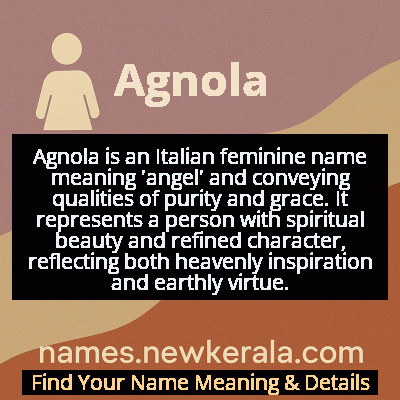Agnola Name Meaning & Details
Origin, Popularity, Numerology Analysis & Name Meaning of Agnola
Discover the origin, meaning, and cultural significance of the name AGNOLA. Delve into its historical roots and explore the lasting impact it has had on communities and traditions.
Name
Agnola
Gender
Female
Origin
Italian
Lucky Number
5
Meaning of the Name - Agnola
Agnola is an Italian feminine name meaning 'angel' and conveying qualities of purity and grace. It represents a person with spiritual beauty and refined character, reflecting both heavenly inspiration and earthly virtue.
Agnola - Complete Numerology Analysis
Your Numerology Number
Based on Pythagorean Numerology System
Ruling Planet
Mercury
Positive Nature
Adventurous, dynamic, curious, and social.
Negative Traits
Restless, impatient, inconsistent, prone to indulgence.
Lucky Colours
Green, white.
Lucky Days
Wednesday.
Lucky Stones
Emerald.
Harmony Numbers
1, 3, 9.
Best Suited Professions
Sales, marketing, travel, entertainment.
What People Like About You
Versatility, charisma, adventurous spirit.
Famous People Named Agnola
Agnola Segni
Renaissance Poet
Florentine poet known for her sonnets and contributions to Renaissance literature
Agnola Torelli
Noblewoman and Patron
Italian noblewoman who supported arts and education during the Renaissance
Agnola Tacca
Artist's Model
Model for Baroque sculptures and daughter of famous sculptor Ferdinando Tacca
Name Variations & International Equivalents
Click on blue names to explore their detailed meanings. Gray names with will be available soon.
Cultural & Historical Significance
The name appears in historical records of Florence, Venice, and other Italian city-states, often associated with women of literary and artistic circles. Its usage declined after the Renaissance but maintained a presence in certain regions, preserving its connection to Italy's rich cultural heritage and the humanist values that characterized the period. The name represents a fascinating intersection of pagan classical traditions and Christian spirituality that defined much of Italian cultural development.
Extended Personality Analysis
Women named Agnola are often perceived as possessing a graceful and refined demeanor, combining intellectual depth with emotional sensitivity. They typically exhibit strong intuitive abilities and a natural inclination toward creative expression, whether in arts, literature, or interpersonal relationships. The name suggests someone who values harmony and beauty, often serving as a calming presence in social situations while maintaining a thoughtful, introspective nature.
Agnolas are frequently described as having a strong moral compass and innate sense of purity in their intentions, which draws others to trust and confide in them. Their combination of spiritual awareness and practical wisdom makes them excellent mediators and counselors, capable of seeing multiple perspectives while remaining true to their core values. This balance between earthly practicality and higher ideals often makes Agnolas respected figures in their communities, embodying the name's dual meaning of both angelic guidance and human purity.
Modern Usage & Popularity
In contemporary times, Agnola remains a rare but cherished name, primarily used in Italy and among Italian diaspora communities. It has experienced a modest revival in recent years as parents seek unique yet historically significant names with classical roots. While not appearing on popular baby name lists, it maintains a steady presence in regions with strong Renaissance heritage like Tuscany and Umbria. The name appeals to parents valuing cultural tradition and linguistic beauty, often chosen by those with interest in Italian history or classical literature. Modern Agnolas typically benefit from the name's uniqueness while carrying forward its rich cultural legacy, making it a distinctive choice that stands out without being overly unconventional.
Symbolic & Spiritual Meanings
Symbolically, Agnola represents the intersection of divine grace and human purity, embodying the ideal of spiritual beauty manifested in earthly form. The name carries connotations of protection and guidance, much like the angelic figures it references, suggesting a bridge between heavenly ideals and human experience. It symbolizes innocence that has been tempered by wisdom, purity that understands complexity, and grace that withstands life's challenges. In metaphorical terms, Agnola represents the human capacity for transcendence – the ability to maintain spiritual integrity while engaging fully with the material world. The name evokes images of light, clarity, and elevated consciousness, suggesting someone who brings illumination to dark situations and clarity to confusion.

